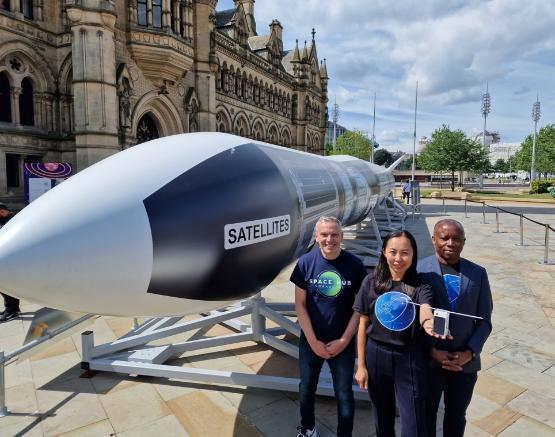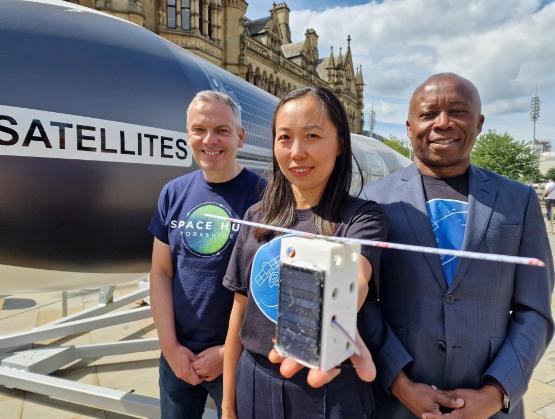Pocket rocket: Countdown to university’s 2024 mini-satellite launch begins at UK Space Agency event

The countdown has begun to the launch of the University of Bradford’s miniature satellite, which will be sent into low earth orbit in 2024.
The university’s Bradford Renduchintala Centre for Space AI showcased a prototype of the ‘pocket cube’ satellite at the UK Space Agency’s Space for Everyone Tour, which is in Bradford’s Centenary Square from July 6-10.
Centre director Professor Ifiok Otung was pictured alongside a 72ft-long replica of a rocket, with business development manager Xiaolei Wang, and Glenn McCauley from Space Hub Yorkshire, who also sits on the Innovation and Skills Advisory Board at the centre.

Professor Otung said: “We are delighted that Bradford is one of only 10 UK cities selected to host this summer’s UK Space Agency’s Space for Everyone Tour and are excited to support the event to allow us the opportunity to enthuse young minds about the limitless possibilities of space and the exciting prospects of a future career in the sector.
“Space technology is critical for tackling some of society’s biggest challenges, such as climate change, natural disasters, world poverty, the digital divide, and a rapidly increasing data consumption and demand for ubiquitous broadband connectivity.
“The Bradford-Renduchintala Centre for Space AI of the University of Bradford brings together a multidisciplinary team of experts from academia and industry to deliver research and training that drive a low-cost and sustainable exploitation of space to meet some of these challenges.
“Visitors to our stand will have the chance to discuss with our team about space, and to engage in hands-on activities building a paper satellite and attempting thought-provoking space quizzes.”
The ‘pocket cube’ prototype is about the same size as a Rubik’s Cube – academics are currently working on the real one, which will contain an array of sensors including a camera, temperature sensor, GPS module and accelerometer.
The university’s stand also contained activities to get children interested in science and technology, including a ‘make-your-own' cardboard satellite pack.
Glenn said: “The Bradford-Renduchintala Centre for Space AI is a key asset for our region and I want to ensure it plays a leading role in the development of the Space Hub Yorkshire project and can benefit from other space-related developments.”
Xiaolei said: “The team are so excited to participate in this fantastic event and to promote the university’s ambition to work with the community, and to continue to develop our strength and ambitious in space technologies.”
The Bradford-Renduchintala Centre for Space AI was made possible thanks to a multi-million-pound donation from alumnus Murthy Renduchintala. It offers £10,000 scholarships in MSc Satellite Systems Engineering.
For more information visit the website or the LinkedIn account.
